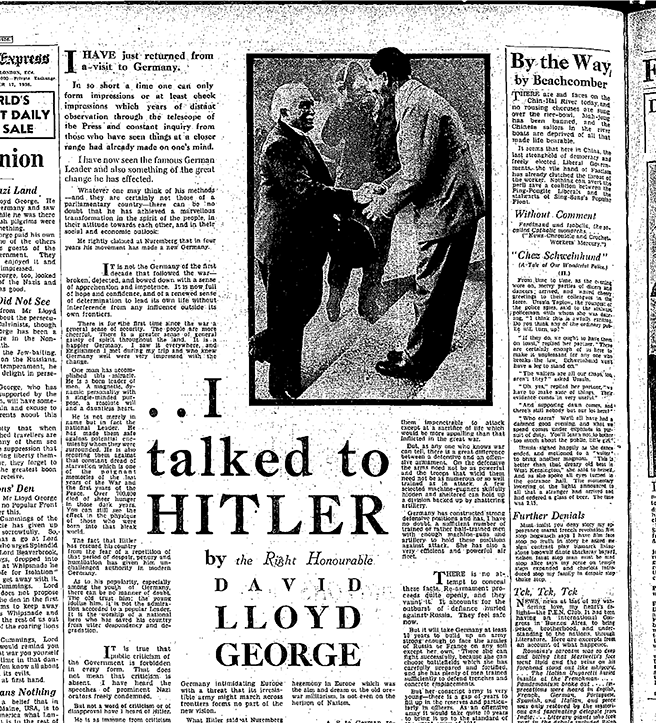Your basket is currently empty!

David Lloyd-George: Potential Nazi Puppet
Anytime there is a ranking of “Greatest Welsh People”, former Prime Minister, David Lloyd-George, is usually ranked among the greatest. Deservedly so, in fact, as he remains the only Welshman to become U.K. Prime Minister more than one-hundred years after his resignation in 1922.
The “Welsh Wizard“, as he is often termed, was originally born in Manchester to Welsh parents on the 17th of January 1863 and spent much of his childhood in Sir Benfro (Pembrokeshire), where he was educated in Cymraeg. He was the Member of Parliament for the now extinct constituency of Carnarvon Boroughs between 1890 and 1945, making him one of the longest-serving MPs in addition to Cymru’s only Prime Minister – a Welsh-speaking one, too.
A Welsh Political Titan
Lloyd-George became renowned for his oratory skills (which can be viewed on YouTube); his sharp wit and his often superior political intelligence which made him one of the biggest political figures of his day. He rose to the role of Prime Minister midway through the Second World War in 1916 after his predecessor and former Liberal Party leader, H.H. Asquith, had failed to unite Parliament with a National/Coalition wartime Government.
This, however, does not mean that Lloyd-George was without issue. In fact, his legacy is as polarising and, indeed, as controversial as any. He had always been seen as polarising for his stubbornness and tendency to go against his own political party; his radicalism was also often seen as an issue by the Parliamentarians of the time. However, it would be something which occurred after his time as Prime Minister which would most impact his legacy.
Lloyd-George Had Always Been Polarising

David Lloyd-George’s legacy in the 21st century is heavily scrutinised over his apparent friendship with Adolf Hitler. In 1936, the then-former Prime Minister flew to Germany to meet the man who was about to push the world into its deadliest war. What would follow was an article in the Daily Express (September 17 1936) titled ‘I Talked to Hitler’, which was written by Lloyd-George as a fawning love affair in which Lloyd-George would praise “his gestures”, “his eyes”, “his voice” and refer to him as the “Saviour of Germany”.
‘I have now seen the famous German Leader and also something of the great change he has effected.
Whatever one may think of his methods — and they are certainly not those of a parliamentary country — there can be no doubt that he has achieved a marvellous transformation in the spirit of the people, in their attitude towards each other, and in their social and economic outlook. . . .
There is for the first time since the war a general sense of security. The people are more cheerful. There is a greater sense of general gaiety of spirit throughout the land. It is a happier Germany. I saw it everywhere and Englishmen I met during my trip and who knew Germany well were very impressed with the change. . . .
As to his popularity, especially among the youth of Germany, there can be no manner of doubt. The old trust him; the young idolise him. It is not the admiration accorded to a popular Leader. It is the worship of a national hero who has saved his country from utter despondency and degradation. . . .
He is as immune from criticism as a king in a monarchical country. He is something more. He is the George Washington of Germany — the man who won for his country independence from all her oppressors. . . .
Hitler fought in the ranks throughout the war, and knows from personal experience what war means. . . .
It is now an avowed part of the Hitler policy to build up an army which will be strong enough to resist every invader from whatever quarter the attack may come. I believe he has already achieved that measure of immunity. . . .
There is no attempt to conceal these facts. Re-armament proceeds quite openly, and they vaunt it.’ – Lloyd-George, 1936
The Welshman would refer to Hitler as a “man of the people” idolised by old and young alike. It was well-established that, despite the looming war, Hitler was something of an Anglophile and Lloyd-George, oft-more British in views than Welsh (certainly in his later years), respected this.
The Operation Sealion Puppet
What’s worse is that it has since been speculated that Hitler, if successful with the never-came-to-fruition Operation Sealion, had planned to install Lloyd-George as the puppet Prime Minister of a conquered United Kingdom, similar to Philippe Pétain in Vichy France. If true, Lloyd George’s legacy is deserving of similar disdain.
We also know that, had Operation Sealion actually taken place and been the success that Hitler hoped for it to be, there was the certain likelihood that Edward VIII – the former King of England who abdicated in the “name of love” to marry his American socialite, divorcee wife, Wallis Simpson – would be installed onto the throne as a Puppet King.
Much like Lloyd-George, Edward had fawned over Hitler to the point of developing an actual friendship with the Nazi Führer, meaning that both he and Lloyd-George would have been valuable tools (or puppets) in a Nazi occupied Great Britain.
More from Welsh Histories
Welsh Histories is a Welsh history celebrating platform which looks to promote all aspects of Welsh history. Though we focus predominantly on native Welsh history, we do also share the non-native aspects from time to time. You can follow us on Facebook; Instagram or Twitter for more. A reader? We also have our very own Welsh Histories Shop where we sell our Welsh Histories Magazine. Diolch yn fawr iawn and keep enjoying Welsh Histories.
Niklas is the founder, owner, manager, editor, writer, video creator, voice over artist, and so forth, of Welsh Histories. He is passionate about the preservation of Welsh culture; the rejuvenation of the Welsh language and the promotion of Welsh history. Niklas currently resides in Pune, Maharashtra, with his beloved wife.

